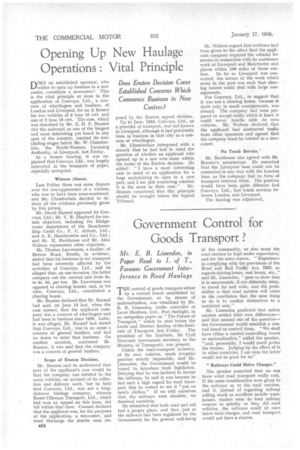Opening Up New Haulage Operations : Vital Principle
Page 38

If you've noticed an error in this article please click here to report it so we can fix it.
Does Enston Decision Cover Established Concerns Which Commence Business in New Centres?
DOES an established operator, who L./wishes to open up business in a new centre, constitute a newcomer? This is the vital principle at issue in the application of Convoys, Ltd., a concern of vvharfingers and hauliers, of London and Liverpool, for an A licence for two vehicles of 6 tons 16 cwt. and one of 2 tons 19 cwt. The case, which was described by Mr. G. H. P. Beames (for the railways) as one of the longest and most interesting yet heard in any part of the country, reached its concluding stages before Mr. W. Chamberlain, the North-Western Licensing Authority, at Liverpool, last Friday.
At a former hearing, it was explained that Convoys, Ltd., was largely interested in the transport of paper, especially newsprint.
Witness Absent.
Last Friday there was some dispute over the non-appearance of a witness, who was to have been cross-examined, and Mr. Chamberlain decided to destroy all the evidence previously given by this person.
Mr. David Karmel appeared for Convoys, Ltd.; AIL V. R. Shepherd for certain objectors, including the Bridgewater department of the Manchester Ship Canal Co., F. C. Abbott, Ltd., and A, E. Handscombe and Co., Ltd.; and Mr. H. Backhouse and Mr. Alan Walters represented other objectors.
Mr. Thomas Lawrenson, a haulier, of Merton Road, Bootle, in evidence, stated that his business in tar transport had been adversely affected by the activities of Convoys, Ltd., and he alleged that, on one occasion, the latter company cut the current rate from 5s. to 4s. ad. per ton. Mr. Lawrenson was opposed to clearing houses, and, in his view, Convoys. Ltd., constituted a elearing house.
Mr. Beames declared that Mr. Karmel had said, on June 14 last, when the case opened, that the applicant company was a concern of wharfingers and had been in business since 1920. Later, it was alleged, Mr. Harmer bad stated that Convoys, Ltd., was in no sense a concern of general hauliers, and had no desire to enter that business. On another occasion, continued Mr. Beanies, it was said that the company was a concern of general hauliers.
Scope of Enston Decision,
Mr. Beames said he understood that part of the applicant's case would be that the company was entitled to the extra vehicles, on account of its collection and delivery work, but he held that Convoys, Ltd., was not a longdistance haulage company, whereas Bouts-Tillotson Transport, Ltd., which had won an appeal on this issue, did fall within that class. Counsel declared that the applicant was, for the purposes of the application, a newcomer, and must discharge the double onus im B24 posed by the Enston appeal decision.
Up to June, 1934, Convoys, Ltd., as a provider of transport, was not known in Liverpool, although it had previously been in business in that city as a concern of whartingers.
Mr. Chamberlain interposed with a remark that he had had in mind the question of whether an applicant who opened up in a new area came within the terms of the Enston decision. He added: "I have a most interesting case in mind of an application for a huge undertaking to open in a new part, and I am just wondering whether it is the same in their case." Mr. Beames considered that this principle should be brought before the Appeal Tribunal. Mr, Walters argued that evidence had been given to the effect that the applicant company required the vehicles for service in connection with its warehouse work at Liverpool and Manchester and places within 100 miles of those cen
tres. So far as Liverpool was concerned, the nature of the work which arose in the port was such that clearing houses could deal with large consignments.
For Convoys, Ltd., to suggest that it was not a clearing house, because it dealt only in small consignments, was absurd. The company had been prepared to accept traffic which it knew it could never handle with its own vehicles. Mr. Walters declared that the applicant had abstracted traffic from other operators and agreed that the company must be treated as a newcomer.
No Trunk Service.'
Mr. Backhouse also agreed with Mr. Bearaes's submissions. He remarked that the Liverpool base could not be connected in any way with the London base, as the company had no form of transport between them. The position would have been q,uite different had .Convoys, Ltd., had trunk services be tween London and Liverpool. The hearing was adjourned.




























































































